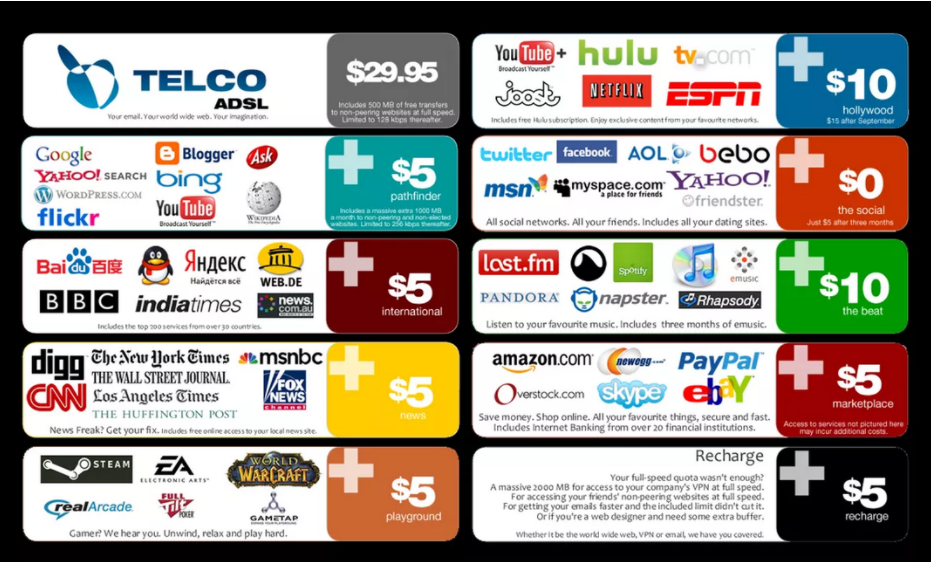
What is Net Neutrality?
Last week the FCC voted to repeal Net Neutrality rules. What is was Net Neutrality?
According to Wikipedia:
Net Neutrality is the principle that Internet service providers must treat all data on the Internet the same, and not discriminate or charge differently by user, content, website, platform, application, type of attached equipment, or method of communication.
Without the concept of Net Neutrality, internet service providers (ISPs) can take action on the content flowing through their networks. One common example of what ISPs would be allowed to do is represented by the following graphic:

What a nightmare!
Common consumers don’t want to pay an added fee just to access free services such as Twitter, but even worse would be having to pay Netflix’s subscription fees and then another fee on top of that to Comcast in order to access Netflix at HD-level speeds.
Can anything be done?
Before we go further, I just want to say that fighting to save Net Neutrality is not a lost cause. We can still pressure Congress to use a “resolution of disapproval” to overturn the FCC’s vote to dismantle the Net Neutrality rules.
Urge lawmakers to reverse the FCC vote today!
Where does CD Baby stand on Net Neutrality?
Allowing ISPs to take action on the content flowing through their networks allows them to choose winners and losers, and will likely stifle innovation. If ISPs decide to enforce pay-to-play rules, then it’s possible only larger corporations with deep pockets will be able to pay up. That could mean ISPs drastically slow down delivery of content from those companies that do not pay. Worse still, they could outright block content provided by competing services. For example, Comcast owns NBC, so perhaps they would slow down or block streaming from CBS properties unless CBS or its consumers pay them an added fee.
These scenarios are not certainties, but they are possible outcomes of repealing Net Neutrality rules. Likely, the initial actions by ISPs will be small and seem innocuous. But as the Internet builds upon itself in layers, so too may ISPs build upon the lack of Net Neutrality in layers, making it that much more difficult to reverse in the future.
“It feels like a slippery slope to allow the big cable and internet companies to decide how fast your internet should be,” says Tony Van Veen, CEO of AVL Digital Group, the parent-company of CD Baby. “There’s no way this will lead to lower rates. To the contrary, rates will go up.”
How does the repeal of Net Neutrality affect artists?
If you look at Wikipedia’s list of Comcast-owned properties, you’ll see they own… quite a lot. Many of those properties have some musical component. Any musical artists signed to a Comcast property could have their music preferred on Comcast’s network. Perhaps Comcast would offer a fee to artists not signed to their own labels to allow fast delivery of music. This would add yet another burden to artists, and those without deep pockets would be left with their music either blocked or not loading as quickly on Comcast networks.
Something else to consider in a world without Net Neutrality – artists may end up forced to distribute their music with certain services if those services are given preferential treatment by ISPs. If Apple pays Comcast a fee to make Apple Music Comcast’s “official” music streaming service, to the detriment of Spotify and others, then artists will likely need to make sure they distribute to Apple Music as well in order to maximize the chance of their music being heard. This removes one element of choice that artists previously had when making decisions about what’s best for their music.
This kind of behavior is anti-competitive, and oftentimes works to the detriment of innovation. The repeal of Net Neutrality rules is bad for independent people throughout the country (and world). With CD Baby already championing independent artists, it only makes sense for CD Baby to champion Net Neutrality, which levels the playing field for all kinds of independent operators.
“Companies that need significant bandwidth – like Spotify, Apple, or Pandora – will possibly (if not likely) face higher internet access costs,” says Van Veen. “As for-profit businesses their goal is to make a profit — albeit eventually, in the case of Spotify and Pandora — which means the higher costs will get passed on to consumers in the form of higher subscription rates. This may impact adoption of streaming by customers, and therefore music consumption levels, if customers decide not to pony up for a Spotify subscription because the price is too high.”
If you feel strongly about this issue, contact your representatives and also sign this online petition to urge lawmakers to reverse the FCC vote.
